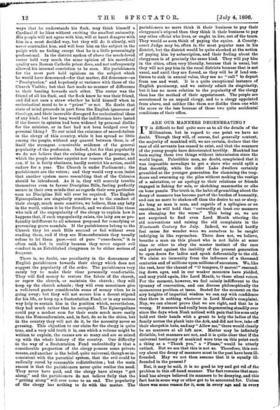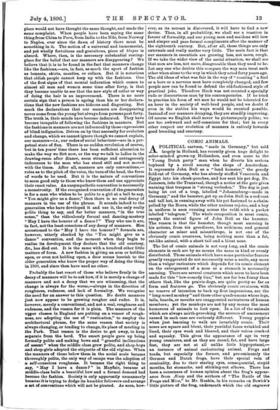ARE OUR MANNERS DEGENERATING P
IT is difficult to feel quite sure as to all the details of the Millennium, but in regard to one point we have no doubt. Though they will, of course, feel generally content, the majority of mankind will, we are certain, declare that the race of old servants has ceased to exist, and that the manners of the young people have deteriorated terribly. Mankind has been saying these two things without intermission since the world began. Paleolithic man, no doubt, complained that it was impossible nowadays to get a slave who could split a flint decently, while the older Lake dwellers certainly grumbled at the younger generation for slamming the trap- doors and swarming up the piles without making the vestige of a salutation, or an apology to their relations or friends engaged in fishing for eels, or sketching mammoths or elks on bone panels. The truth is, the habit of grumbling about the decay of manners has become part of the burden of humanity, and can no more be shaken off than the desire to eat or sleep. As long as man is man, and capable of a syllogism or an emotion, he will hold that "outwardly at least our manners are changing for the worse." This being so, we are not surprised to find even Lord Meath uttering the old conventions and raising the old complaints in the Nineteenth Century for July. Indeed, we should hardly feel cause for wonder were we ourselves to be caught indulging in like reproaches. There does not, we believe, breathe a man on this planet who is not liable at some time or other to obey the master instinct of the race and protest against the inability of the present generation to open doors for ladies and speak deferentially to the old. We claim no immunity from the influence of a thousand centuries and of millions upon millions of ancestors. We, like the rest, hear the chaunt of "0 tempora, 0 mores!" resound- ing down ages, and in our weaker moments have yielded, and may yield again, like Lord Meath, to those silent voices. For the moment, however, we feel calmly indifferent to the tyranny of convention, and can discuss philosophically the momentous problem at issue. Seated for the moment on the airy heights of impartial wisdom we can say with confidence that there is nothing whatever in Lord Meath's complaint. Nay, we can almost prove that we are right, and that he is wrong. If manners had really been degenerating steadily ever since the days when Noah noticed with pain that his sons only held out their hands with a grunt to help the ladies of the family across the plank into the Ark, and did not bow, take off their sheepskin hats, and say "Allow me," there would clearly be no manners at all left now. Matter may be infinitely divisible, but manners are not, and it is quite clear that if the universal testimony of mankind were true on this point such a thing as a "Thank you," a "Please," would be utterly extinct. But we see that this is not so. Therefore, this out- cry about the decay of manners must in the past have been founded. May we not then assume that it is equally ill- founded in the present P But, it may be said, it is no good to try and get rid of the problem in this off-hand manner. The fact remains that man- kind has always believed its manners to be decaying, and this fact has in some way or other got to be accounted for. Unless there was some reason for it, men in every age and in every
place would not have thought the same thought, and made the same oomplaint. When people have been saying the same thing from China to Peru, from India to the Nile, from Norway to Naples, ever since the dawn of history there must be something in it. The notion of a universal and immemorial, and yet wholly fortuitous and gratuitous, piece of blague is absurd. Where, then, is the necessary substantial resting- place for the belief that our manners are disappearing ? We believe that it is to be found in the fact that manners change like the fashions,—are, in fact, as much the sport of fashion as bonnets, skirts, mantles, or collars. But it is notorious that oldish people cannot keep up with the fashions. One of the first signs of that mental induration which comes to almost all men and women some time after forty, is that they become unable to see that the new style of collar or way of doing the hair is an improvement. There is no more certain sign that a person is ageing than his or her declara- tions that the new fashions are hideous and disgusting. But mark the declarations that our manners are disappearing never come from the young but always from persons past forty. The truth is, their minds have become indurated. They have become incapable of following the fashions in manners. But the fashions in manners are not influenced by these expressions of blind indignation. Driven on by that necessity for evolution and change, which we cannot ignore though we cannot explain, our manners—i.e., our codes of social behaviour—are in a per- petual state of flax. There is no sudden revolution of course, but in ten years' time there has been sufficient alteration to make the way we flirt now, or the way we talk to ladies in the drawing-room after dinner, seem strange and outrageously indecorous to the man who has stood still and not moved with the times. After all, manners are only conventions,— rules as to the pitch of the voice, the turn of the head, the form of words to be need. But it is the nature of conventions to seem good only to those who know them and can appreciate their exact value. An unsympathetic convention is necessarily a monstrosity. If the recognised convention of the generation is for a man who wishes to be polite to a girl at a ball to say, "Yon might give us a dance," then there is no real decay of manners in the use of the phrase. It sounds indeed to the generation who have developed it and use it, the only really polite thing to say, and far better manners, "in the true sense," than the ridiculously formal and dancing-mastery "May I have the honour of a dance ?" They who use it are, in fact, not the least conscious of any decay of manners. Men accustomed to the "May I have the honour?" formula are, however, utterly shocked by the "You might give us a dance" convention, and the moment when they begin to realise its development they declare that the old courtesy, &c., has died out. It is the same with a hundred other little matters of form. A new fashion in giving an arm or holding open, or even not holding open, a door seems boorish to the older generation who knew the proper way of doing the thing in 1860, and since then have used no other.
Probably the last resort of those who believe firmly in the decay of manners will be to ask how, if it is merely a change of manners and not a decay that we are witnessing, that the change is always for the worse,—always in the direction of roughness, rudeness, and lack of formality. We recognise the need for an answer to this question. No doubt manners just now appear to be growing rougher and ruder. It is, however, merely a conventional, and not a real, roughness and rudeness, and the reason for it is plain. The manners of the upper classes in England are putting on a veneer of rough- ness, are adopting the use of "rustication," to employ the architectural phrase, for the same reason that society is always changing, or tending to change, its place of meeting in the Park. That reason is the desire to get away, to keep separate from the herd. The smart people gave up being formally polite and making bows and "graceful inclinations of assent" when the middle class grew polite, and shop-boys and shop-girls adopted the etiquette of the old regime. When the manners of those below them in the social scale became thoroughly polite, the only way of escape was the adoption of a self-conscious roughness. It became the right thing to say, ".1ffity I have a dance ? " in Mayfair, because at middle-class balls a beautiful bow and a formal demand had become the fashion. Society is only apparently unmannerly because it is trying to dodge its humbler followers and arrange at set of conventions which will not be pirated. As soon, how-
ever, as its retreat is discovered, it will have to find a new device. Then, in all probability, we shall see a reaction in favour of formality, and our young men and maidens will bow and simper and pass formal compliments after the manner of the eighteenth century. But, after all, these things are only externals and really matter very little. The main fact is that our manners in essentials are growing leas, not more, rough. If we take the wider view of the social situation, we shall see that men are less, not more, disagreeable than they used to be. Let any one who doubts this compare the way men treat each other when alone to the way in which they acted forty years ago. The old ideas of what was fair in the way of " roasting " a fool or a bore or a nervous man have completely changed, and few people now can be found to defend the old-fashioned style of practical joke. Theodore Hook was not counted a specially rude or discourteous man by his contemporaries. If he tried to practise his form of wit now he would not be tolerated for an hour in the society of well-bred people, and we doubt if even in the stables his ways would be counted possible. Instead of our manners decaying, they are steadily improving. Of course we English shall never be picturesquely polite; we are too awkward and self-conscious for that; but in every other respect our evolution of manners is entirely towards good breeding and courtesy.











































 Previous page
Previous page